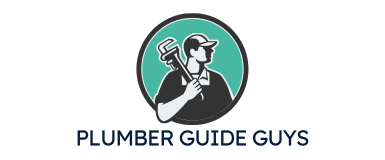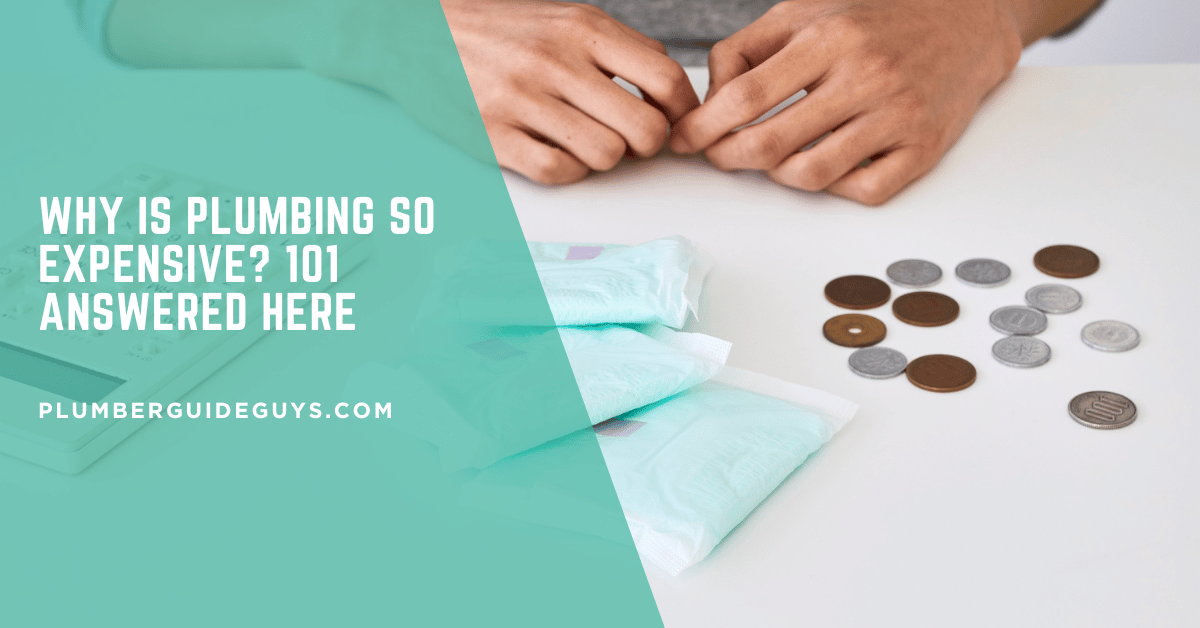Affiliate Disclosure
Plumber Guide Guys is a participant in the Amazon Services LLC Associates Program, an affiliate advertising program designed to provide a means for sites to earn advertising fees by advertising and linking to Amazon.
Why Is Plumbing So Expensive? Did you know the average American homeowner spends $1,000 to $4,000 on plumbing repairs each year? Knowing why plumbing is pricey can help you make better choices for your home’s upkeep and repairs.
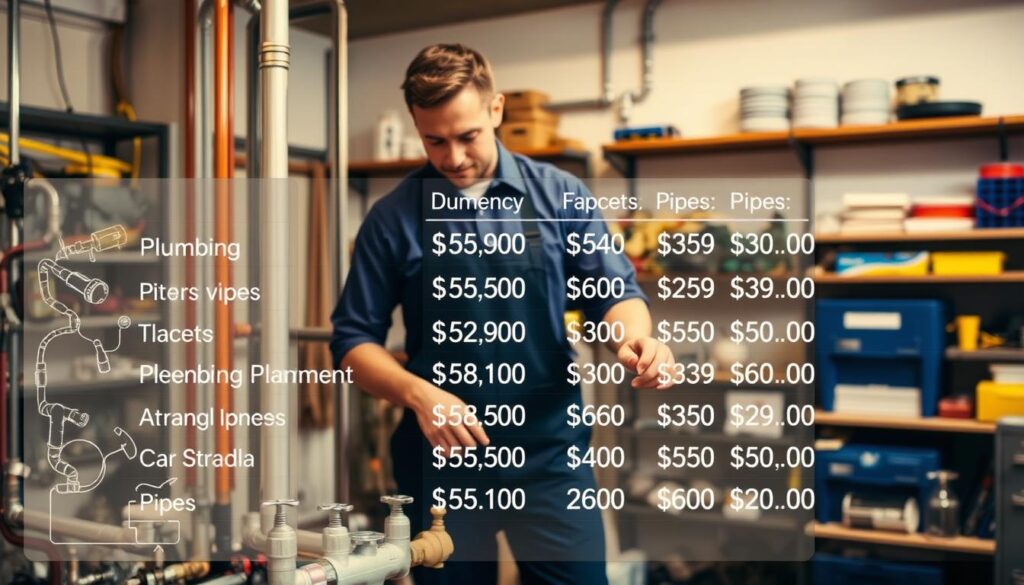
Plumbing is key to your daily life, from doing dishes to enjoying hot showers. But when plumbing issues arise, the cost of hiring pros can feel too high. The cost of plumbing services includes many factors that make them expensive.
Your plumbing system is complex and needs skilled hands to fix. Plumbers spend years learning, buy pricey tools, and keep up with certifications. These costs add up to why plumbing services are so pricey.
Key Takeaways
- Plumbing repairs can cost thousands of dollars annually
- Specialized skills drive higher service prices
- Professional training and equipment are significant cost factors
- Complex plumbing systems require expert knowledge
- Quality repairs prevent more expensive future damages
Table of Contents
Understanding Professional Plumbing Services and Their Costs
Professional plumbing services are more than just fixing pipes. Hiring a skilled plumber means you’re getting more than basic repairs. The cost reflects their training, skills, and investments in quality service.
Plumbing labor costs include many important parts for excellent service and safety. Let’s look at what affects professional plumbing prices.
Specialized Training and Licensing Requirements
To become a professional plumber, one must commit a lot. Plumbers go through:
- 4-5 years of apprenticeship
- Technical school education
- State-mandated licensing exams
- Ongoing professional development
“A licensed plumber represents years of dedicated learning and practical experience” – National Plumbing Association
Insurance and Liability Coverage
Professional plumbers need to buy insurance for themselves and their clients. This includes:
- General liability insurance
- Workers’ compensation
- Professional indemnity insurance
Equipment and Tool Investments
Advanced plumbing needs special tools and technology. Plumbers spend a lot on equipment to solve complex problems quickly.
| Equipment Category | Estimated Investment |
|---|---|
| Advanced Diagnostic Tools | $5,000 – $15,000 |
| Specialized Repair Equipment | $3,000 – $10,000 |
| Safety and Protective Gear | $1,000 – $3,000 |
Knowing these professional aspects helps understand why plumbing services cost more. The expertise, investments, and protection provided are worth the fees.
Why Is Plumbing So Expensive: Breaking Down the Costs
Plumbing costs can seem high because of many factors. Plumbing services are more than just fixing leaks or unclogging drains. The work is complex, making it a valuable service that costs a lot.
Let’s look at the main reasons plumbing services are pricey:
- Specialized Expertise: Plumbers get a lot of training to solve tough problems
- They use advanced tools to find hidden issues
- They use top-quality materials and parts
- They also have to pay for business costs like insurance and upkeep
There’s more to plumbing costs than just fixing things. Plumbers spend a lot of time and money on:
- Keeping their skills sharp and getting certified
- Buying the latest diagnostic tools
- Getting good insurance
- Keeping their equipment and vehicles in top shape
Even though it might cost a lot upfront, hiring a pro is worth it. It prevents bigger problems that could cost even more to fix. Your money keeps your property safe and working well.
Professional plumbing isn’t an expense—it’s a critical investment in your property’s longevity and functionality.
The Impact of Emergency Services on Plumbing Rates
Emergency plumbing service prices can shock homeowners when unexpected issues arise. Understanding why plumbers charge so much during urgent situations helps you prepare for unexpected costs.
Plumbing emergencies demand immediate attention and disrupt normal work schedules. Professionals must be ready to respond quickly, which creates unique pricing challenges.
After-Hours Service Premiums
When pipes burst or major leaks occur outside standard business hours, emergency plumbing service prices significantly increase. Plumbers sacrifice personal time and comfort to address critical situations.
- Nighttime callouts typically cost 1.5-2x standard rates
- Immediate response requires specialized on-call staffing
- Advanced scheduling and planning become challenging
Urgent Response Requirements
Why do plumbers charge so much during emergencies? The answer lies in specialized equipment, immediate availability, and preventing property damage.
- Rapid diagnostic capabilities
- Specialized emergency repair tools
- Risk mitigation expertise
Weekend and Holiday Rates
Weekend and holiday emergency services come with premium pricing due to increased operational costs and reduced workforce availability.
Emergency plumbing repairs can cost up to 3x more during non-standard hours.
Knowing these factors helps homeowners understand and budget for emergency plumbing expenses.
Quality Materials and Their Effect on Pricing
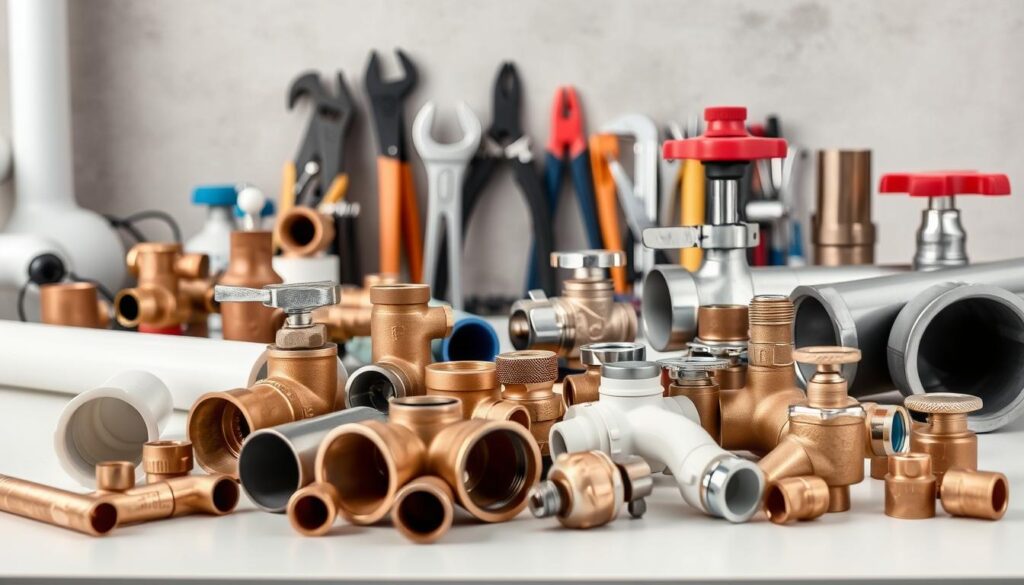
The quality of materials greatly affects the cost of plumbing repairs. High-quality materials can raise your project’s budget. It’s important to know the different options available.
Plumbing materials vary in price and performance. Key factors to consider include:
- Copper Piping: Known for durability but typically the most expensive option
- PEX (Cross-linked Polyethylene): A more affordable and flexible alternative
- CPVC (Chlorinated Polyvinyl Chloride): Cost-effective and resistant to corrosion
The material you choose affects both short-term and long-term costs. Copper pipes might seem pricey at first but last longer. PEX and CPVC are more budget-friendly and durable.
| Material | Average Cost per Foot | Durability |
|---|---|---|
| Copper | $2.50 – $4.00 | 50+ years |
| PEX | $0.50 – $2.00 | 40-50 years |
| CPVC | $0.40 – $1.50 | 50-75 years |
Professional plumbers suggest choosing materials based on your needs, budget, and long-term goals. Even though high-quality materials may cost more upfront, they can save you money in the long run by reducing repair and replacement costs.
Labor Costs and Skill-Based Pricing in Plumbing
Plumbing labor costs are key in any plumbing service. They show the special skills and knowledge needed in this tough trade. Knowing how plumber hourly rates are set helps you see the worth of professional plumbing services.
Professional plumbers spend a lot of time and effort to get better at their job. Their prices reflect several important factors that affect plumbing labor costs.
Hourly Rates Explained
Plumber hourly rates change a lot based on several key things:
- Complexity of the job
- Required specialized skills
- Type of plumbing system
- Equipment needed
Experience-Based Pricing
More experienced plumbers usually charge more. The more expertise a plumber has, the more value you get. Beginners might charge less, but pros do jobs faster and better.
| Experience Level | Typical Hourly Rate | Skill Complexity |
|---|---|---|
| Entry-Level Plumber | $45 – $65 | Basic Repairs |
| Journeyman Plumber | $65 – $85 | Advanced Installations |
| Master Plumber | $85 – $150 | Complex Systems |
Regional Cost Variations
Plumbing labor costs change a lot based on where you are. Cities with higher costs of living have higher plumber rates than rural areas. The demand for plumbers in your area also affects prices.
Understanding these points helps you make better choices about plumbing services. It shows the skill and effort behind professional pricing.
Hidden Fees and Additional Charges in Plumbing Services
When you plan a plumbing repair, knowing the costs can save you money. Many people are surprised by extra fees that weren’t mentioned first.
Costs for plumbing services go beyond the basic price. Plumbers often add several hidden charges to your bill:
- Trip charges for travel time and distance
- Material markup percentages
- Equipment rental fees
- Disposal and cleanup expenses
- Permitting and inspection costs
These extra fees can make your final bill much higher. Plumbers usually have good reasons for these charges.
“Always request a detailed estimate to understand the complete cost structure of your plumbing service.” – Professional Plumbing Association
Some common hidden fees include:
| Fee Type | Average Cost Range | Typical Explanation |
|---|---|---|
| Trip Charge | $50 – $150 | Covers transportation and initial assessment |
| Material Markup | 10% – 30% | Compensation for procurement and handling |
| Disposal Fee | $25 – $100 | Proper waste removal and environmental compliance |
To handle these costs well, always ask for a detailed quote and talk about extra fees before starting. Being open about costs helps avoid unexpected bills.
The Role of Market Demand in Plumbing Costs
To understand why plumbing costs are high, we must look at market dynamics. Plumbing costs are not just about service fees. They are also influenced by economic factors that shape prices.
Plumbing service pricing is complex. It’s influenced by many market factors. Homeowners and property managers often find the cost changes surprising.
Seasonal Price Fluctuations
Seasonal changes affect plumbing service rates. In winter, demand for plumbing services goes up. This is because of pipe issues and extreme weather:
- Winter pipe freezing emergencies
- Increased repair needs during extreme weather
- Limited availability of skilled technicians
Geographic Location Impact
Your location affects plumbing service costs. Different areas face unique pricing challenges:
| Region | Average Hourly Rate | Cost Factors |
|---|---|---|
| Northeast | $125-$175 | High cost of living, strict regulations |
| Midwest | $85-$110 | Lower population density, competitive market |
| West Coast | $100-$150 | Urban complexity, advanced infrastructure |
Competition Factors
The local competitive landscape affects plumbing service pricing. Areas with fewer skilled professionals see higher rates. This is because there are fewer options.
Tip: Always get multiple quotes to understand the true market rate in your specific location.
Understanding Warranty and Guarantee Costs
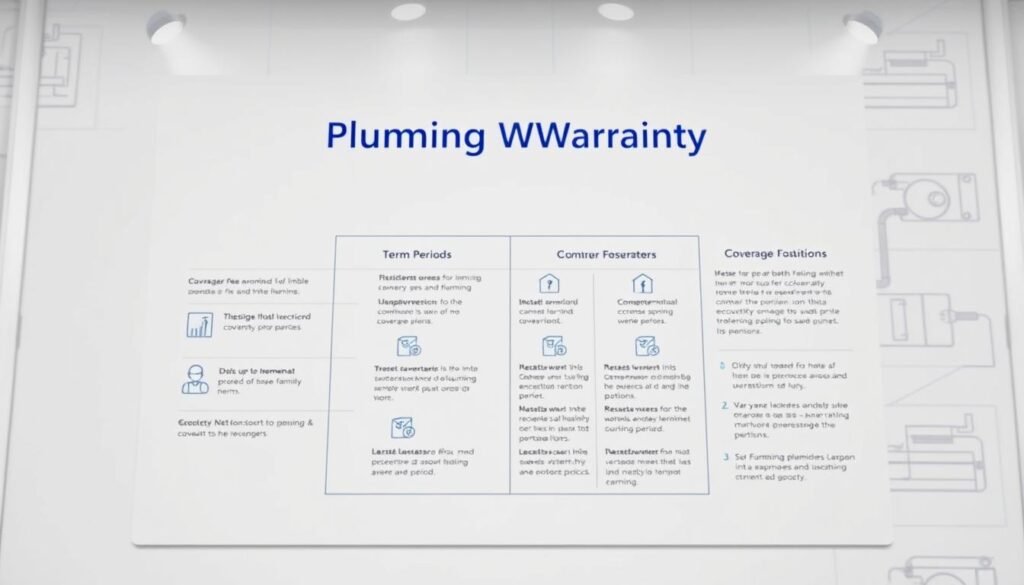
Warranties are key when looking at plumber fees. They protect your investment and offer peace of mind. A good warranty can save you money on future repairs.
Top plumbing services offer various warranties. These cover different parts of their work. You’ll usually find:
- Workmanship guarantees
- Parts replacement coverage
- Extended protection for major systems
Warranties do more than just protect you at first. By choosing a plumbing service with a strong warranty, you’re investing in reliability. Plumbers know their reputation depends on quality and promises.
Warranty types affect repair costs:
- Short-term warranties: 1-2 years, less expensive
- Extended warranties: 5-10 years, more upfront cost
- Manufacturer warranties: For specific parts
Think about the long-term savings when looking at warranty costs. A bit more upfront can save you from big repair bills later. Always check what your warranty covers to make a smart choice.
Modern Technology’s Impact on Plumbing Expenses
Technology has changed the plumbing world a lot. It now helps plumbers find and fix problems better. New tools help understand what makes plumbing expensive and how costs change.
Today, plumbers use advanced tools for better service. They have digital pipe locators, infrared cameras, and hydro-jetters. These tools make finding and fixing problems more accurate.
- Sewer cameras allow real-time underground pipe inspections
- Thermal imaging identifies hidden moisture and leaks
- Electronic pipe locators pinpoint exact underground pipe locations
- Advanced leak detection sensors minimize invasive exploratory work
These new tools cost more at first but save money in the long run. Smart plumbing technologies help find problems early. This means less damage and lower repair costs.
Even though these tools raise service prices, they make plumbing better. Plumbers can solve problems quicker and with less damage. They offer more precise solutions.
“Technology transforms plumbing from reactive repairs to proactive maintenance.”
Knowing about these new tools helps see why plumbing services cost more now. The investment in these tools means plumbing services are more reliable and efficient.
Conclusion
Understanding plumbing costs is complex. It involves many factors. Professional plumbers spend a lot on training, equipment, and quality service. This keeps your home’s systems safe.
Looking at the cost, you see that expertise is pricey. Things like licenses, insurance, and tech tools add up. Emergency calls, seasonal needs, and where you live also affect prices. This ensures pros can help you fast and well.
Seeing plumbing as an investment in your home is smart. Even if it costs more upfront, it saves you money in the long run. Always ask for clear quotes and know what you’re getting. Skilled work keeps your home’s water and drainage systems working right.
Knowing about these costs helps you choose wisely. Quality, reliability, and skill are worth it for your home’s safety. Your home is your most valuable asset, after all.
